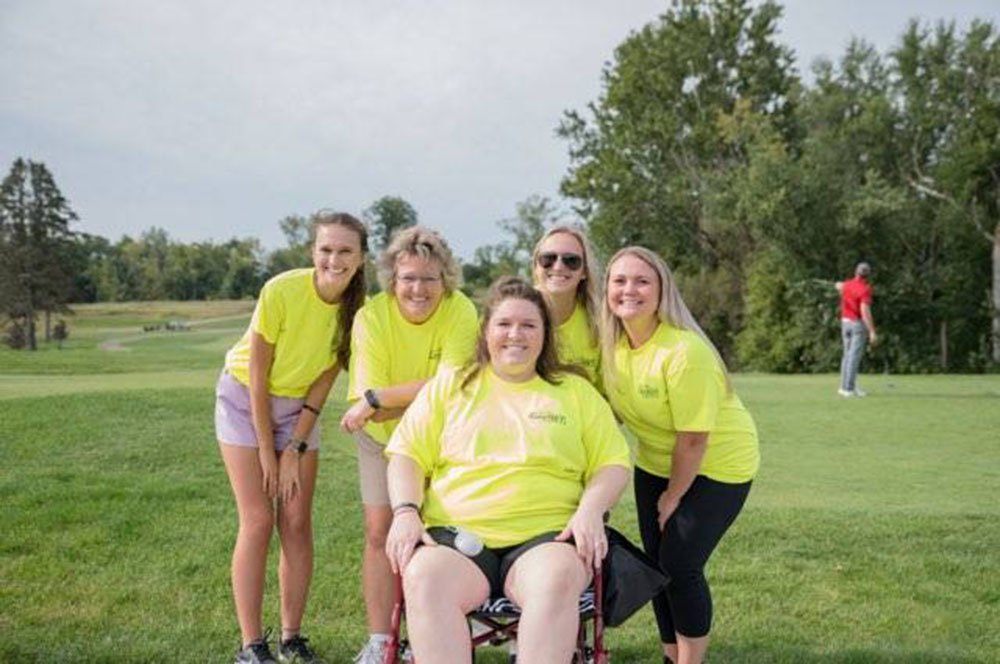
The CureNET Project donates $30,000 to NETRF
The CureNET Project was founded in April of 2022 when Brittany Holzhauer was diagnosed with neuroendocrine cancer. The mission of The CureNET Project is to raise money to fund NET research, raise awareness about NETs and assist other families in the NET community.
This is Brittany’s story.
Brittany Holzhauer had her whole future planned. A self-professed “dreamer” with incredible determination, she started her career as pharmacist in 2018 and with her husband Luke, welcomed her first child, Lorelei, in June of 2019.
“Lorelei was perfect, and we immediately fell in love with her. Everything I had been working for my entire life was finally coming together, I was living my dream,” said Brittany.
About a week after Lorelei was born, Brittany developed severe abdominal pain, and it was determined that her gall bladder needed to be removed immediately. Following surgery, her symptoms resolved, and she resumed a normal life, enjoying every minute with her young family.
Between the arrival of Lorelei and the birth of her second child, son Dean in April of 2021, Brittany dealt with a host of GI problems, but never got any definitive answers. Just six weeks after Dean was born, Brittany began experiencing chest pain, night sweats and flushing.
“I attributed those symptoms to being post-partum and breastfeeding, but still I went to see my primary care provider because something did not feel right. I completed routine lab work that showed my liver enzymes were significantly elevated and was once again referred to a gastroenterologist,” said Brittany.
Quite quickly things progressed after a liver ultrasound: doctors informed Brittany and Luke that there were several small tumors on her liver, as well as a softball-sized tumor and a baseball-sized one.
“Doctors suspected the tumors originated in my pancreas which expressed hormones that likely were the cause of my reoccurring symptoms. After imaging and a biopsy, it was confirmed that I had Stage IV Pancreatic Neuroendocrine Tumors (pNET).”
“The diagnosis was overwhelming to say the least. I went from this life I had worked so hard for to feeling like I was losing it all in a matter of seconds. My heart broke thinking about my children and what this diagnosis would mean for them.”
After a thorough review of Brittany’s medical history with her care team, it was determined that she had been dealing with the residual health effects from tumors that had been growing in her body from as far back as her time as an undergraduate student at The Ohio State University.
Brittany found a team of doctors at OSU and started on CAPTEM, an oral form of chemotherapy, within two weeks of her diagnosis.
“The tumors on my liver and pancreas were too plentiful and large, therefore I was not a candidate for surgery, which is generally the only way to effectively rid my body of this disease. The goal with CAPTEM was to shrink the tumors to a point where surgery could be an option. After five cycles of CAPTEM, my symptoms had improved slightly but the tumors were not shrinking, so I stopped CAPTEM and transferred my care to one of the top NET doctors at the Mayo Clinic in Rochester, MN.”
After consultation with the Mayo Clinic team, Brittany underwent hepatic artery embolization; essentially surgeons attempt to cut off the blood supply to the larger tumors so that they would shrink and eventually die. After her second embolization treatment, Brittany was a candidate for Whipple surgery, which she underwent on August 26th of this year.
“The surgery went well, and they were able to remove the primary tumor on the head of my pancreas with clear margin, and removed 16 lymph nodes, four of which were cancerous. The remaining visible cancer in my body is now only in my liver. Since the surgery, I have been recovering well, outside of some incision complications, and adjusting to a new diet. It has been painful and difficult but without a doubt it is worth all of it. Currently I am only on Lanreotide to control my symptoms. I will have scans every 3 months for the next 6 months and then we will determine a plan moving forward, which could potentially include a liver transplant. While the recovery has been long and difficult, we are very hopeful for the future,” said Brittany.
And we at NETRF are all very hopeful for you, too!
The CureNET Project held its first golf tournament fundraiser this summer. A hugely successful, sold out event, CureNET raised close to $40,000 and is generously donating $30,000 to NETRF to fund research to build brighter, healthier futures for patients living with NETs.
